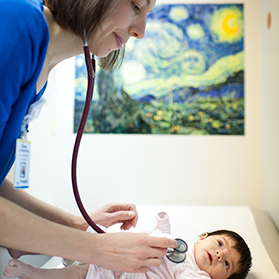What Should I do if my Child is Having a Seizure?

Seeing your child have a seizure is scary – especially if they've never had one. However, if your child is having a seizure, Diana Brinker MD, a pediatrician at TriHealth's Group Health Western Hills, says your first step in home care is to “try not to panic.”
My Child is Having a Seizure: How Should I React?
Next, make sure your child is in a safe place. The main goal is to protect your child from injury and try to prevent a fall.
If your child is starting to fall, help him or her to the ground, away from furniture or other sharp objects, and make sure your child is in a position in which he or she can breathe easily. “What can happen sometimes is they can sort of stop breathing because their body is having such a severe seizure, but that usually doesn’t happen,” Dr. Brinker points out.
You should also:
- Cushion your child's head
- Loosen any tight clothing, especially around your child’s neck
- Turn your child on his or her side (if vomiting occurs, this helps make sure the vomit is not inhaled into the lungs)
When to Call 911
From there, note how long it takes for the seizure to end. “If it does resolve, and it’s the first time this has ever happened, your child should still go to their doctor to be evaluated – either through the emergency room or their primary doctor,” Dr. Brinker adds.
If the seizure lasts longer than two to five minutes, call 911. Otherwise, call 911 or your local emergency number if:
- Your child does not awaken or have normal behavior after a seizure.
- Another seizure starts soon after a seizure ends.
- Your child had a seizure in water.
- Your child is injured, or has diabetes.
- There is anything different about this seizure, compared to your child's usual seizures.
The Prognosis
In children who have epilepsy (two or more unprovoked seizures) – but they are otherwise healthy – their seizures can usually be managed through medication. Most children who have febrile seizures often grow out of these by age five.
Bottom Line: Be an Advocate
Because there are so many different types of seizures, with varying symptoms, Dr. Brinker stresses the importance of bringing up any concerns you may have with your child's doctor. "If there is either a concern for seizures or you know that they have had a history of seizures, or something doesn't seem right to you, bring it up to their doctor and discuss your concerns," she explains. "A lot of times it's the parent who figures out something is wrong before we do."